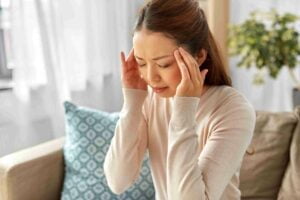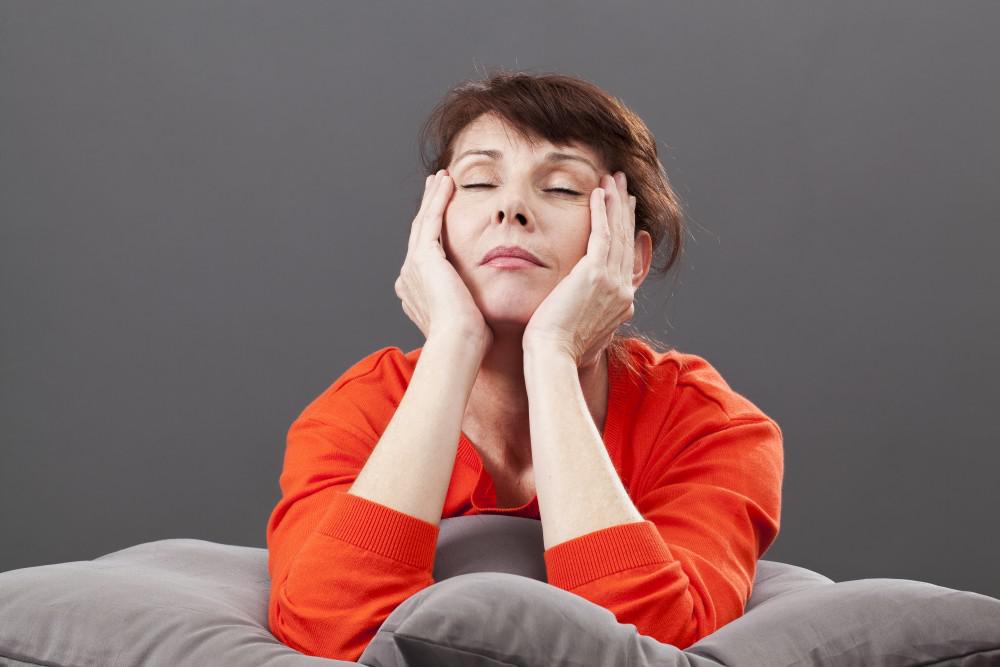Welcome to a phase of life that many women embark upon – menopause. As if the hormonal shifts, hot flashes, and mood swings weren’t enough, menopause often brings along a less-discussed companion: headaches. These menopause headaches can vary in intensity and frequency, adding an extra layer of complexity to an already transformative journey. In this blog, we’ll explore the realm of menopause headaches, shedding light on their causes, symptoms, and most importantly, effective strategies to manage and alleviate the discomfort they bring.
Contents
What Do Menopause Headaches Feel Like?
 Menopause headaches can vary in their characteristics, and different women may experience them differently. Here are some common features associated with menopause headaches:
Menopause headaches can vary in their characteristics, and different women may experience them differently. Here are some common features associated with menopause headaches:
- Throbbing or Pulsating Pain
Menopause headaches, especially migraines, often involve a throbbing or pulsating sensation. This rhythmic pain can be moderate to severe and may affect one or both sides of the head.
- Duration
The duration of menopause headaches can vary. Some women may experience short-lived headaches, while others may endure longer episodes that last for hours or even days.
- Intensity
The intensity of menopause headaches can range from mild discomfort to debilitating pain. Migraines, in particular, are known for causing severe pain that can interfere with daily activities.
- Location
This type of headache can occur in different areas of the head. While some women may feel pain on one side of the head, others may experience it on both sides. The pain can be localized in the temples, forehead, or the back of the head.
- Associated Symptoms
Headaches are often accompanied by other symptoms. These may include sensitivity to light (photophobia), sound (phonophobia), and sometimes even nausea or vomiting. Some women may also experience visual disturbances known as auras before the onset of a migraine headache.
It’s important to note that not all women going through menopause will experience headaches, and those who do may have varying symptoms. If you are experiencing persistent or severe headaches during menopause, it’s advisable to consult with a healthcare professional for a proper diagnosis and personalized treatment plan.
What Are The Possible Causes Of It?
Menopause headaches can have various causes. And they are often linked to the hormonal changes that occur during this transitional phase. The primary factor contributing to headaches is the decline in estrogen levels. This plays a key role in regulating blood vessels. As estrogen levels fluctuate, it can lead to changes in blood flow and trigger headaches. Other contributing factors include:
- Hormonal Fluctuations: The significant decline in estrogen levels during menopause can affect the brain’s blood vessels, leading to headaches. Estrogen is known to have a stabilizing effect on blood vessels, and its reduction can result in vasodilation and increased sensitivity to pain.
- Migraine Sensitivity: Women who have a history of migraines may find that the onset or exacerbation of migraines is associated with menopause. Hormonal changes can act as a trigger for migraines in susceptible individuals.
- Stress and Lifestyle Factors: Menopause is a time of significant life changes, and stress is a common trigger for headaches. Lack of sleep, irregular meal patterns, dehydration, and other lifestyle factors can also contribute to the development or intensification of headaches.
- Cervical Spine Changes: Menopausal hormonal changes may affect the cervical spine, leading to tension-type headaches. Changes in muscle tone and function in the neck and shoulders can contribute to headache development.
- Genetic Predisposition: A family history of headaches or migraines can increase the likelihood of experiencing headaches. Genetic factors may make some individuals more susceptible to hormonal changes triggering headaches.
- Environmental Triggers: Certain environmental factors, such as changes in weather, bright lights, loud noises, or specific odors, can act as triggers for headaches during menopause.
Understanding the individual factors contributing to menopause headaches is crucial for effective management. Women experiencing persistent or severe headaches during menopause should consult with a healthcare professional.
Do Menopause Headaches Go Away?
 For some women, menopause headaches may gradually diminish or even disappear over time as the body adjusts to the hormonal changes associated with menopause. As the hormonal fluctuations stabilize and the body adapts to the new normal, the frequency and intensity of headaches may decrease. However, it’s crucial to note that the resolution of headaches varies from person to person. Some women may continue to experience occasional headaches even after the initial phases of menopause, while others find significant relief as their bodies adapt to the hormonal transition.
For some women, menopause headaches may gradually diminish or even disappear over time as the body adjusts to the hormonal changes associated with menopause. As the hormonal fluctuations stabilize and the body adapts to the new normal, the frequency and intensity of headaches may decrease. However, it’s crucial to note that the resolution of headaches varies from person to person. Some women may continue to experience occasional headaches even after the initial phases of menopause, while others find significant relief as their bodies adapt to the hormonal transition.
Seeking medical advice is essential for effective management, as healthcare professionals can provide personalized guidance and recommend appropriate interventions based on the specific characteristics and triggers of the headaches. Whether through lifestyle adjustments, medications, or a combination of approaches, addressing menopause headaches is often a gradual process. Thus, it involves understanding individual factors and tailoring the approach accordingly.
How Do You Stop Menopause Headaches?
Managing and alleviating menopause headaches involves a combination of lifestyle changes, self-care practices, and, in some cases, medical interventions. Here are several strategies that may help:
Hormone Replacement Therapy (HRT)
HRT is a medical intervention that involves supplementing or replacing hormones, particularly estrogen, to alleviate symptoms associated with hormonal fluctuations during menopause. For women experiencing menopause headaches linked to hormonal imbalances, HRT may help stabilize hormone levels and reduce the frequency and intensity of headaches.
Lifestyle Modifications
Engaging in lifestyle modifications is a fundamental aspect of managing headaches. Regular exercise is known to have positive effects on overall well-being, stress reduction, and sleep quality. A balanced and nutritious diet, rich in antioxidants and low in potential headache triggers, can contribute to headache prevention. Adequate hydration is essential, as dehydration can exacerbate headache symptoms.
Stress Management
Stress is a common trigger for headaches during menopause, and effective stress management techniques can play a crucial role in headache prevention. Practices such as deep breathing, meditation, and yoga can help reduce stress levels and promote relaxation. Adequate and quality sleep is another vital component of stress management. Establishing a consistent sleep routine and creating a conducive sleep environment can positively impact overall well-being and minimize the occurrence of headaches.
Identify and Avoid Triggers
Understanding and identifying specific triggers for menopause headaches is essential for effective management. Keeping a headache diary can help track patterns and pinpoint potential triggers, whether they are related to certain foods, environmental factors, or stressors. Once identified, efforts can be made to minimize exposure to these triggers. This proactive approach empowers individuals to take control of their environment and lifestyle, making it easier to implement targeted strategies for headache prevention.
Over-the-Counter Medications
Over-the-counter (OTC) medications can be useful for managing mild to moderate headaches. Non-prescription pain relievers such as ibuprofen or acetaminophen can help alleviate pain and reduce inflammation associated with headaches. However, it’s crucial to use these medications as directed and to consult with a healthcare professional before incorporating them into a routine, especially for individuals with pre-existing health conditions or those taking other medications.
Alternative Therapies
Alternative therapies, such as acupuncture, biofeedback, and chiropractic care, may be considered complementary approaches to managing headaches. Acupuncture involves the insertion of thin needles into specific points on the body, aiming to rebalance energy flow. Biofeedback helps individuals gain control over physiological functions, such as muscle tension and heart rate, to reduce stress and headaches.
Chiropractic care focuses on spinal adjustments to improve overall health. While some individuals may find relief through these alternative therapies, their effectiveness can vary, and it’s essential to consult with a healthcare professional before incorporating them into a headache management plan. These therapies are often part of a holistic approach that addresses the individual’s unique needs and preferences in collaboration with conventional medical interventions.
Can Menopause Cause Headaches Everyday?
 Yes, menopause can potentially cause headaches every day for some women, though the frequency and intensity can vary widely among individuals. Hormonal fluctuations, especially the decline in estrogen levels during menopause, are often associated with the onset of headaches. Estrogen plays a role in regulating blood vessels, and its reduction can lead to changes in blood flow that may trigger headaches. These hormonal shifts can create a persistent pattern of headache development in some women, causing daily or near-daily occurrences.
Yes, menopause can potentially cause headaches every day for some women, though the frequency and intensity can vary widely among individuals. Hormonal fluctuations, especially the decline in estrogen levels during menopause, are often associated with the onset of headaches. Estrogen plays a role in regulating blood vessels, and its reduction can lead to changes in blood flow that may trigger headaches. These hormonal shifts can create a persistent pattern of headache development in some women, causing daily or near-daily occurrences.
Everyday stressors associated with the challenges of menopause, combined with pre-existing susceptibility to headaches, may lead to a heightened likelihood of experiencing daily headaches. It’s crucial for individuals experiencing daily headaches during menopause to consult with a healthcare professional. A thorough evaluation can help identify specific triggers, explore suitable management strategies, and, if necessary, consider medical interventions.
Conclusion
In wrapping up our exploration of menopause headaches, it’s clear that this phase brings about a diverse range of experiences for women. From hormonal shifts to lifestyle factors, the causes of these headaches are multifaceted. The key takeaway is that every woman’s journey through menopause is unique, and so too are the headaches that may accompany it. Armed with knowledge about triggers, lifestyle adjustments, and potential interventions, women can navigate this chapter with resilience and empowerment.
Whether it’s through hormone replacement therapy, lifestyle changes, or a combination of strategies, finding what works best on an individual level is essential. Remember, seeking guidance from healthcare professionals and embracing a holistic approach can make the road through the headaches more manageable, helping women emerge stronger on the other side of this transformative journey.
If you are facing menopause related issues, menopause treatment at HerMantra can help. Book your free trial online menopause treatment session now.


